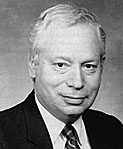Physical Society ColloquiumSpecial Colloquium SeriesThe McGill University Physics Department proudly announces a special colloquium series in honour of the 2003 honorary degree recipients, Professors David Levy and Steven Weinberg. On the morning of the Science Faculty convocation, Thursday June 5th, Professors Levy and Weinberg will each give a colloquium, to which the general public is cordially invited.Both lectures will be held in the Keys Auditorium of the Ernest Rutherford Physics Building on McGill University's main campus. The schedule of events is:
Brief BiographiesDavid Levy At age 12, forced to stay at home with a broken arm, David Levy read a
book about the solar system and decided he wanted to become an astronomer.
A few years later, he saw his first comet, Ikeya-Seki, which started his
search for others.
At age 12, forced to stay at home with a broken arm, David Levy read a
book about the solar system and decided he wanted to become an astronomer.
A few years later, he saw his first comet, Ikeya-Seki, which started his
search for others.
Levy became an international celebrity in 1994 when, with world-renowned astronomers the late Eugene Shoemaker and Carolyn Shoemaker, he discovered the comet Shoemaker-Levy 9. When the comet hit Jupiter, it created a mushroom cloud larger than Asia. As no one had ever seen a comet crash into a planet, the images of these collisions became front-page news and forever changed our perception of our place in the solar system. Levy first studied English literature at Acadia University. A prolific writer, he is the author or editor of 29 books that span historical, cultural, literary and scientific domains, and is the science editor of Parade Magazine.
Steven Weinberg Nobel Laureate, renowned writer and theoretical physicist, Steven Weinberg
is the Josey Regental Professor of Science at the University of Texas at
Austin and the Morris Loeb Visiting Professor of Physics at Harvard
University.
Nobel Laureate, renowned writer and theoretical physicist, Steven Weinberg
is the Josey Regental Professor of Science at the University of Texas at
Austin and the Morris Loeb Visiting Professor of Physics at Harvard
University.
Arguably the premier theoretical physicist alive today, in 1979 he shared the Nobel Prize in Physics with Abdus Salam and Sheldon Glashow for his 1967 discovery of what has come to be known as the Standard Model of particle physics, which unified the electromagnetic and weak interactions and currently is the definitive theoretical understanding of all non-gravitational phenomena. The author of four classic physics textbooks, Weinberg has begun an often controversial dialogue with social scientists and others about the very nature of scientific knowledge and of the role of religion in society, as seen in his recent collection of essays, `Facing Up -- Science and its Cultural Adversaries'. |